- Home
- Margaret Atwood
The MaddAddam Trilogy
The MaddAddam Trilogy Read online
ALSO BY MARGARET ATWOOD
FICTION
The Edible Woman
Surfacing
Lady Oracle
Dancing Girls
Life Before Man
Bodily Harm
Murder in the Dark
Bluebeard’s Egg
The Handmaid’s Tale
Cat’s Eye
Wilderness Tips
Good Bones
The Robber Bride
Alias Grace
The Blind Assassin
Good Bones and Simple Murders
The Penelopiad
The Tent
Moral Disorder
POETRY
Double Persephone
The Circle Game
The Animals in That Country
The Journals of Susanna Moodie
Procedures for Underground
Power Politics
You Are Happy
Selected Poems: 1965–1975
Two-Headed Poems
True Stories
Interlunar
Selected Poems II: Poems Selected and New, 1976–1986
Morning in the Burned House
Eating Fire: Selected Poetry 1965–1995
The Door
NONFICTION
Survival: A Thematic Guide to Canadian Literature
Days of the Rebels, 1815–1840
Second Words
Strange Things: The Malevolent North in Canadian Literature
Two Solicitudes: Conversations (with Victor-Lévy Beaulieu)
Negotiating with the Dead: A Writer on Writing
Moving Targets: Writing with Intent 1982–2004
Curious Pursuits: Occasional Writing
Writing with Intent: Essays, Reviews, Personal Prose, 1983–2005
Payback: Debt and the Shadow Side of Wealth
In Other Worlds: SF and the Human Imagination
FOR CHILDREN
Up in the Tree
Anna’s Pet (with Joyce Barkhouse)
For the Birds
Princess Prunella and the Purple Peanut
Rude Ramsay and the Roaring Radishes
Bashful Bob and Doleful Dorinda
Wandering Wenda
VINTAGE CANADA E-OMNIBUS, 2013
Copyright © 2013 O. W. Toad Ltd.
All rights reserved under International and Pan-American Copyright Conventions. No part of this book may be reproduced in any form or by any electronic or mechanical means, including information storage and retrieval systems, without permission in writing from the publisher, except by a reviewer, who may quote brief passages in a review.
Oryx and Crake
Published in Canada by Vintage Canada, a division of Random House of Canada Limited, Toronto, in 2009. Originally published in hardcover by McClelland & Stewart in 2003. All rights reserved.
Copyright © 2003 O. W. Toad Ltd.
e-ISBN: 9780307400840
The Year of the Flood
Published in Canada by Vintage Canada, a division of Random House of Canada Limited, Toronto, in 2010. Originally published in hardcover by McClelland & Stewart in 2009. All rights reserved.
Copyright © 2009 O. W. Toad Ltd.
e-ISBN: 9780307398925
MaddAddam
Originally published in Canada by McClelland & Stewart, a division of Random House of Canada Limited, Toronto, in 2013. All rights reserved.
Copyright © 2013 O. W. Toad Ltd.
e-ISBN: 9780771008979
E-omnibus edition published in Canada by Vintage Canada, a division of Random House of Canada Limited, Toronto, in 2013.
Vintage Canada with colophon is a registered trademark.
www.randomhouse.ca
These are works of fiction. Names, characters, places, and incidents are the products of the author’s imagination or are used fictitiously. Any resemblance to actual persons, living or dead, is entirely coincidental.
The MaddAddam Trilogy e-ISBN: 9780345808752
v3.1
Contents
Cover
Other Books by This Author
Title Page
Copyright
Oryx and Crake
The Year of the Flood
MaddAddam
A Note On the Author
VINTAGE CANADA EDITION, 2009
COPYRIGHT © 2003 O.W. TOAD LTD.
EXCERPT FROM THE YEAR OF THE FLOOD COPYRIGHT © 2009 O.W. TOAD LTD.
All rights reserved under International and Pan-American Copyright Conventions. No part of this book may be reproduced in any form or by any electronic or mechanical means, including information storage and retrieval systems, without permission in writing from the publisher, except by a reviewer, who may quote brief passages in a review.
Published in Canada by Vintage Canada, a division of Random House of Canada Limited, Toronto, in 2009. Originally published in hardcover in Canada by McClelland & Stewart Ltd., Toronto, in 2003, and in trade paperback by Emblem Editions, an imprint of McClelland & Stewart Ltd., in 2005. Distributed in Canada by Random House of Canada Limited, Toronto.
Vintage Canada and colophon are registered trademarks of Random House of Canada Limited.
www.randomhouse.ca
This book is a work of fiction. Names, characters, places, and incidents either are the product of the author’s imagination or are used fictitiously. Any resemblance to actual persons, living or dead, events, or locales is entirely coincidental.
Library and Archives Canada Cataloguing in Publication
Atwood, Margaret, 1939–
Oryx and Crake / Margaret Atwood.
eISBN: 978-0-307-40084-0
I. Title.
PS8501.t86o79 2009 c813′.54 c2009-900380-5
v3.0
For my family
I could perhaps like others have astonished you
with strange improbable tales; but I rather chose
to relate plain matter of fact in the simplest
manner and style; because my principal design
was to inform you, and not to amuse you.
Jonathan Swift,
Gulliver’s Travels
Was there no safety? No learning by heart of
the ways of the world? No guide, no shelter,
but all was miracle and leaping from the
pinnacle of a tower into the air?
Virginia Woolf,
To the Lighthouse
Contents
Master - Table of Contents
Cover
Title Page
Copyright
Dedication
1
Mango ~ Flotsam ~ Voice
2
Bonfire ~ OrganInc Farms ~ Lunch
3
Nooners ~ Downpour
4
Rakunk ~ Hammer ~ Crake ~ Brainfrizz ~ HottTotts
5
Toast ~ Fish ~ Bottle
6
Oryx ~ Birdcall ~ Roses ~ Pixieland Jazz
7
Sveltana ~ Purring ~ Blue
8
SoYummie ~ Happicuppa ~ Applied Rhetoric ~ Asperger’s U. ~ Wolvogs ~ Hypothetical ~ Extinctathon
9
Hike ~ RejoovenEsense ~ Twister
10
Vulturizing ~ AnooYoo ~ Garage ~ Gripless
11
Pigoons ~ Radio ~ Rampart
12
Pleebcrawl ~ BlyssPluss ~ MaddAddam ~ Paradice ~ Crake in Love ~ Takeout ~ Airlock
13
Bubble ~ Scribble ~ Remnant
14
Idol ~ Sermon
15
Footprint
Acknowledgments
1
~
Mango
~
Snowman wakes be
fore dawn. He lies unmoving, listening to the tide coming in, wave after wave sloshing over the various barricades, wish-wash, wish-wash, the rhythm of heartbeat. He would so like to believe he is still asleep.
On the eastern horizon there’s a greyish haze, lit now with a rosy, deadly glow. Strange how that colour still seems tender. The offshore towers stand out in dark silhouette against it, rising improbably out of the pink and pale blue of the lagoon. The shrieks of the birds that nest out there and the distant ocean grinding against the ersatz reefs of rusted car parts and jumbled bricks and assorted rubble sound almost like holiday traffic.
Out of habit he looks at his watch – stainless-steel case, burnished aluminum band, still shiny although it no longer works. He wears it now as his only talisman. A blank face is what it shows him: zero hour. It causes a jolt of terror to run through him, this absence of official time. Nobody nowhere knows what time it is.
“Calm down,” he tells himself. He takes a few deep breaths, then scratches his bug bites, around but not on the itchiest places, taking care not to knock off any scabs: blood poisoning is the last thing he needs. Then he scans the ground below for wildlife: all quiet, no scales and tails. Left hand, right foot, right hand, left foot, he makes his way down from the tree. After brushing off the twigs and bark, he winds his dirty bedsheet around himself like a toga. He’s hung his authentic-replica Red Sox baseball cap on a branch overnight for safekeeping; he checks inside it, flicks out a spider, puts it on.
He walks a couple of yards to the left, pisses into the bushes. “Heads up,” he says to the grasshoppers that whir away at the impact. Then he goes to the other side of the tree, well away from his customary urinal, and rummages around in the cache he’s improvised from a few slabs of concrete, lining it with wire mesh to keep out the rats and mice. He’s stashed some mangoes there, knotted in a plastic bag, and a can of Sveltana No-Meat Cocktail Sausages, and a precious half-bottle of Scotch – no, more like a third – and a chocolate-flavoured energy bar scrounged from a trailer park, limp and sticky inside its foil. He can’t bring himself to eat it yet: it might be the last one he’ll ever find. He keeps a can opener there too, and for no particular reason an ice pick; and six empty beer bottles, for sentimental reasons and for storing fresh water. Also his sunglasses; he puts them on. One lens is missing but they’re better than nothing.
He undoes the plastic bag: there’s only a single mango left. Funny, he remembered more. The ants have got in, even though he tied the bag as tightly as he could. Already they’re running up his arms, the black kind and the vicious little yellow kind. Surprising what a sharp sting they can give, especially the yellow ones. He rubs them away.
“It is the strict adherence to daily routine that tends towards the maintenance of good morale and the preservation of sanity,” he says out loud. He has the feeling he’s quoting from a book, some obsolete, ponderous directive written in aid of European colonials running plantations of one kind or another. He can’t recall ever having read such a thing, but that means nothing. There are a lot of blank spaces in his stub of a brain, where memory used to be. Rubber plantations, coffee plantations, jute plantations. (What was jute?) They would have been told to wear solar topis, dress for dinner, refrain from raping the natives. It wouldn’t have said raping. Refrain from fraternizing with the female inhabitants. Or, put some other way …
He bets they didn’t refrain, though. Nine times out of ten.
“In view of the mitigating,” he says. He finds himself standing with his mouth open, trying to remember the rest of the sentence. He sits down on the ground and begins to eat the mango.
Flotsam
~
On the white beach, ground-up coral and broken bones, a group of the children are walking. They must have been swimming, they’re still wet and glistening. They should be more careful: who knows what may infest the lagoon? But they’re unwary; unlike Snowman, who won’t dip a toe in there even at night, when the sun can’t get at him. Revision: especially at night.
He watches them with envy, or is it nostalgia? It can’t be that: he never swam in the sea as a child, never ran around on a beach without any clothes on. The children scan the terrain, stoop, pick up flotsam; then they deliberate among themselves, keeping some items, discarding others; their treasures go into a torn sack. Sooner or later – he can count on it – they’ll seek him out where he sits wrapped in his decaying sheet, hugging his shins and sucking on his mango, in under the shade of the trees because of the punishing sun. For the children – thick-skinned, resistant to ultraviolet – he’s a creature of dimness, of the dusk.
Here they come now. “Snowman, oh Snowman,” they chant in their singsong way. They never stand too close to him. Is that from respect, as he’d like to think, or because he stinks?
(He does stink, he knows that well enough. He’s rank, he’s gamy, he reeks like a walrus – oily, salty, fishy – not that he’s ever smelled such a beast. But he’s seen pictures.)
Opening up their sack, the children chorus, “Oh Snowman, what have we found?” They lift out the objects, hold them up as if offering them for sale: a hubcap, a piano key, a chunk of pale-green pop bottle smoothed by the ocean. A plastic BlyssPluss container, empty; a ChickieNobs Bucket O’Nubbins, ditto. A computer mouse, or the busted remains of one, with a long wiry tail.
Snowman feels like weeping. What can he tell them? There’s no way of explaining to them what these curious items are, or were. But surely they’ve guessed what he’ll say, because it’s always the same.
“These are things from before.” He keeps his voice kindly but remote. A cross between pedagogue, soothsayer, and benevolent uncle – that should be his tone.
“Will they hurt us?” Sometimes they find tins of motor oil, caustic solvents, plastic bottles of bleach. Booby traps from the past. He’s considered to be an expert on potential accidents: scalding liquids, sickening fumes, poison dust. Pain of odd kinds.
“These, no,” he says. “These are safe.” At this they lose interest, let the sack dangle. But they don’t go away: they stand, they stare. Their beachcombing is an excuse. Mostly they want to look at him, because he’s so unlike them. Every so often they ask him to take off his sunglasses and put them on again: they want to see whether he has two eyes really, or three.
“Snowman, oh Snowman,” they’re singing, less to him than to one another. To them his name is just two syllables. They don’t know what a snowman is, they’ve never seen snow.
It was one of Crake’s rules that no name could be chosen for which a physical equivalent – even stuffed, even skeletal – could not be demonstrated. No unicorns, no griffins, no manticores or basilisks. But those rules no longer apply, and it’s given Snowman a bitter pleasure to adopt this dubious label. The Abominable Snowman – existing and not existing, flickering at the edges of blizzards, apelike man or manlike ape, stealthy, elusive, known only through rumours and through its backward-pointing footprints. Mountain tribes were said to have chased it down and killed it when they had the chance. They were said to have boiled it, roasted it, held special feasts; all the more exciting, he supposes, for bordering on cannibalism.
For present purposes he’s shortened the name. He’s only Snowman. He’s kept the abominable to himself, his own secret hair shirt.
After a few moments of hesitation the children squat down in a half-circle, boys and girls together. A couple of the younger ones are still munching on their breakfasts, the green juice running down their chins. It’s discouraging how grubby everyone gets without mirrors. Still, they’re amazingly attractive, these children – each one naked, each one perfect, each one a different skin colour – chocolate, rose, tea, butter, cream, honey – but each with green eyes. Crake’s aesthetic.
They’re gazing at Snowman expectantly. They must be hoping he’ll talk to them, but he isn’t in the mood for it today. At the very most he might let them see his sunglasses, up close, or his shiny, dysfunctional watch, or his baseball cap. They like th
e cap, but don’t understand his need for such a thing – removable hair that isn’t hair – and he hasn’t yet invented a fiction for it.
They’re quiet for a bit, staring, ruminating, but then the oldest one starts up. “Oh Snowman, please tell us – what is that moss growing out of your face?” The others chime in. “Please tell us, please tell us!” No nudging, no giggling: the question is serious.
“Feathers,” he says.
They ask this question at least once a week. He gives the same answer. Even over such a short time – two months, three? He’s lost count – they’ve accumulated a stock of lore, of conjecture about him: Snowman was once a bird but he’s forgotten how to fly and the rest of his feathers fell out, and so he is cold and he needs a second skin, and he has to wrap himself up. No: he’s cold because he eats fish, and fish are cold. No: he wraps himself up because he’s missing his man thing, and he doesn’t want us to see. That’s why he won’t go swimming. Snowman has wrinkles because he once lived underwater and it wrinkled up his skin. Snowman is sad because the others like him flew away over the sea, and now he is all alone.
“I want feathers too,” says the youngest. A vain hope: no beards on the men, among the Children of Crake. Crake himself had found beards irrational; also he’d been irritated by the task of shaving, so he’d abolished the need for it. Though not of course for Snowman: too late for him.
Now they all begin at once. “Oh Snowman, oh Snowman, can we have feathers too, please?”
“No,” he says.
“Why not, why not?” sing the two smallest ones.
“Just a minute, I’ll ask Crake.” He holds his watch up to the sky, turns it around on his wrist, then puts it to his ear as if listening to it. They follow each motion, enthralled. “No,” he says. “Crake says you can’t. No feathers for you. Now piss off.”
“Piss off? Piss off?” They look at one another, then at him. He’s made a mistake, he’s said a new thing, one that’s impossible to explain. Piss isn’t something they’d find insulting. “What is piss off?”

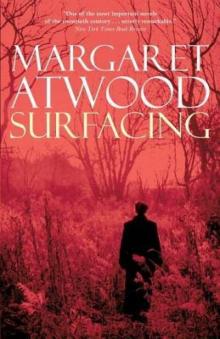 Surfacing
Surfacing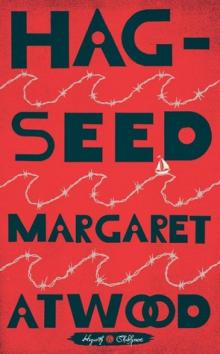 Hag-Seed
Hag-Seed Oryx and Crake
Oryx and Crake The Heart Goes Last
The Heart Goes Last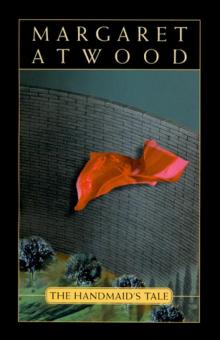 The Handmaid's Tale
The Handmaid's Tale Lady Oracle
Lady Oracle Good Bones and Simple Murders
Good Bones and Simple Murders The Robber Bride
The Robber Bride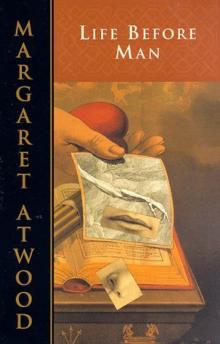 Life Before Man
Life Before Man Alias Grace
Alias Grace The Blind Assassin
The Blind Assassin Cat's Eye
Cat's Eye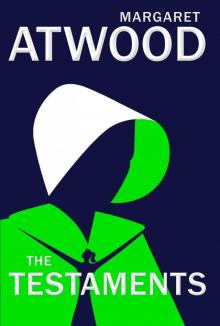 The Testaments
The Testaments The Penelopiad
The Penelopiad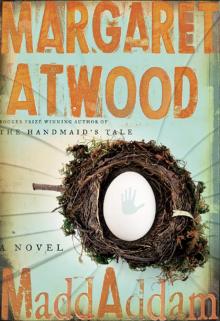 MaddAddam
MaddAddam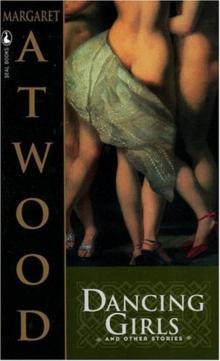 Dancing Girls & Other Stories
Dancing Girls & Other Stories On Writers and Writing
On Writers and Writing Selected Poems II (1976-1986)
Selected Poems II (1976-1986) Wilderness Tips
Wilderness Tips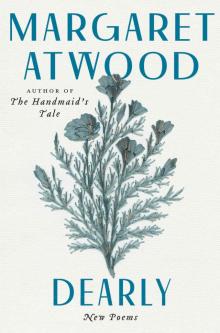 Dearly
Dearly The Tent
The Tent Bluebeard's Egg
Bluebeard's Egg The Edible Woman
The Edible Woman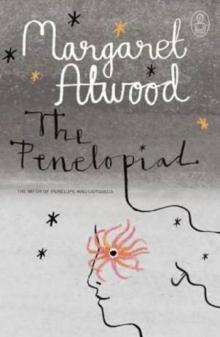 The Penelopiad: The Myth of Penelope and Odysseus
The Penelopiad: The Myth of Penelope and Odysseus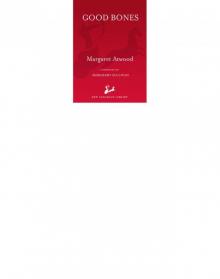 Good Bones
Good Bones I Dream of Zenia with the Bright Red Teeth
I Dream of Zenia with the Bright Red Teeth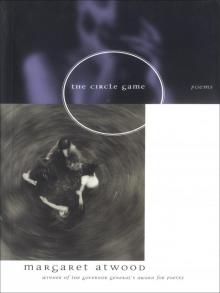 Circle Game
Circle Game Choke Collar: Positron, Episode Two
Choke Collar: Positron, Episode Two Stone Mattress: Nine Tales
Stone Mattress: Nine Tales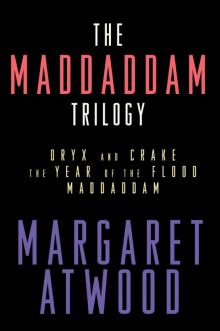 The MaddAddam Trilogy
The MaddAddam Trilogy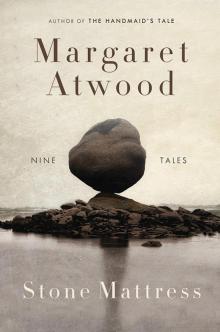 Stone Mattress
Stone Mattress Power Politics
Power Politics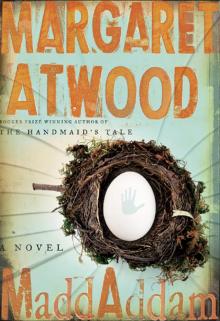 MaddAddam 03 - MaddAddam
MaddAddam 03 - MaddAddam I’m Starved for You (Kindle Single)
I’m Starved for You (Kindle Single) Murder in the Dark
Murder in the Dark In Other Worlds
In Other Worlds Dancing Girls
Dancing Girls Moral Disorder
Moral Disorder